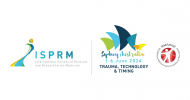Session outline
Pain management is a significant barrier and obstacle to rehabilitation and recovery following brain injury. To date there has been limited research, resources, and access to appropriate specialised pain services for this population. The aim of the workshop is to improve knowledge and understanding of the complexities of pain management when working with people with a brain injury.
The team will present the current evidence for pain management for people with a brain injury and take participants through a stepped process to develop and implement individually tailored pain management plans. Participants will be provided with access to new resources designed for pain management with this cohort. In addition, participants will be presented with information and access to a newly developed online training program designed to train clinicians in the principles and strategies for pain management with the TBI population, as well as a novel clinical reasoning tool to aid in treatment planning. There will be a practical component aimed at building capacity to develop pain management plans and the opportunity to explore the challenges with managing chronic pain and TBI. The presenters will also reflect on their experience of working with people with a brain injury.
This workshop involves didactic presentation, videos, discussion, reflection, and practical skill acquisition. There will be time for participants to practice clinical skills in small groups. This workshop is suitable for all levels of experience and all disciplines.
Learning outcomes
- Participants can expect to build clinical skills in the area of pain management for people following a brain injury.
- Participants will be provided with opportunities to improve and practice clinical skills with real-time feedback from expert clinicians.
- Participants can expect to learn the ways to modify an assessment for someone with a rbain injury and chronic pain.
- Participants will be provided with a clinical framework to develop an individualised pain management plan and learn skills and strategies to implement treatment approaches for this population.
- Participants will understand how to employ physical activity strategies, such as activity pacing, increasing physical activity and improving leisure activity to help consumers manage pain.
- Participants will learn techniques to help consumers manage depression and anxiety, such as thought swaps, relaxation tools and managing thoughts and emotions.
- Participants will learn tools to help consumers improve their sleep and reduce fatigue, for example, sleep practices, the boom and bust pattern and how to recharge.
- Participants will learn ways to help consumers make sustainable changes and implement pain management strategies into their everyday lives.
Target audience
- Allied health
- Medical practitioners
- Nursing staff



